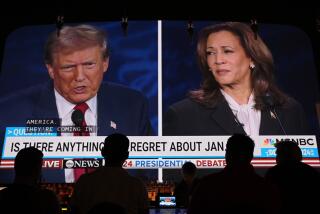After campaign finance ruling, battle for Congress likely to heat up
- Share via
WASHINGTON -- Both major political parties predicted an expanded battle for control of Congress in the months ahead following Wednesday’s Supreme Court decision to end aggregate limits on big donors.
Conservative groups trying to flip control of the Senate to Republicans particularly celebrated their ability now to repeatedly tap big donors who previously would have maxed out at $123,200 per election cycle. The court did away with that limit.
“BOOM - Great news!” wrote the conservative Club for Growth’s spokesman Barney Keller on Twitter.
Democrats have largely opposed loosening campaign spending and viewed the court’s decision with worry. It expanded on the pivotal 2010 Citizens United case, which opened the door for unlimited spending on political issues by independent groups.
“Another step on the road to ruination,” said Sen. Charles E. Schumer (D-N.Y), adding that the decision could result in “the end of any fairness in the political system as we know it.”
At the same time, Democrats also stand to benefit from the decision because it will allow the party’s House and Senate campaign committees to similarly return to deep-pocketed donors. Even more, the committees are allowed to coordinate with the candidate’s campaigns in ways the outside groups are precluded from doing.
“That’ll significantly boost our efforts to keep control of the Senate,” said Matt Canter, deputy executive director of the Democratic Senatorial Campaign Committee, which has already raised more money than its GOP counterpart.
Fund-raising by both committees, however, is being dwarfed by the money being raised by the outside groups.
“It’s just that they have the two brothers,” Canter added. “One is named Charles Koch and the other is named David Koch,” he said, referring to the billionaire industrialists who back conservative Senate candidates through the $100-million Americans for Prosperity group. “They are trying to buy themselves the U.S. Senate.”
In the House, where Speaker John A. Boehner’s majority is not expected to be in jeopardy in November, the leader welcomed the push away from Watergate-era restrictions as a 1st Amendment victory for donors.
“Freedom of speech is being upheld,” Boehner said. “Donors ought to have the freedom to give what they want to give.”
But within the GOP there are divisions. Sen. John McCain (R-Ariz.), the architect of a landmark campaign finance reform law, predicted the decision would lead to “scandals involving corrupt public officials” and anonymous donors -- and the need for reforms once again.
And Sen. Angus King, the independent from Maine who aligns with Democrats, said he was introducing legislation to require the the immediate disclosure of all donations greater than $1,000.
One point is certain, said the independent watchdog group Sunlight Foundation, which tracks money in politics: The wealthy stand to gain greater influence over the process.
The court “might as well have tied a big bow around Congress and delivered it to the 1%,” the organization said in a statement.
Twitter: @lisamascaroinDC
More to Read
Sign up for Essential California
The most important California stories and recommendations in your inbox every morning.
You may occasionally receive promotional content from the Los Angeles Times.












